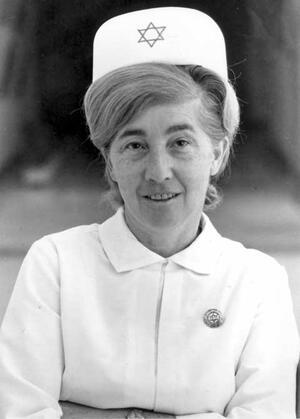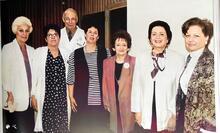Judith Steiner-Freud
Judith Steiner-Freud, a graduate of the Henrietta Szold Hadassah School of Nursing, became the director of her alma mater, as well as Deputy Dean of nursing in the medical faculty of Hadassah and the Hebrew University of Jerusalem, and thus had an important influence on the development of nursing education and practice in Israel.
Courtesy of Judith Steiner-Freud
Judith Steiner-Freud, a Holocaust survivor, was a prominent figure in moving nursing education into Israel’s universities. In 1975, as the director of the Henrietta Szold Hadassah School of Nursing, she established the first basic Israeli university program for nursing at the Hebrew University-Hadassah Medical Faculty in Jerusalem. Her close contact with Hadassah, the Women's Zionist Organization of America promoted this project. Steiner-Freud took part in the activities of the Israeli Nurses Association and in efforts to support nursing education in African countries in the 1960s. She also reestablished the Alumni Association of Hadassah-Hebrew University School of Nursing (1990). In addition, she published several articles in journals in Israel and abroad and won many awards.
Judith Steiner-Freud, a Holocaust survivor, was a prominent figure who professionalized the field of nursing education by establishing training programs in Israel’s universities. Beginning in the 1960s, Steiner-Freud took part in the activities of the Israeli Nurses Association and in efforts to support nursing education in African countries. In 1975, as the director of the Henrietta Szold Hadassah School of Nursing, she established the first basic Israeli university program for nursing at the Hebrew University-Hadassah Medical Faculty in Jerusalem. Hadassah, the Women's Zionist Organization of America, with whom she had close ties, promoted this project. Later, she also re-established the Alumni Association of Hadassah-Hebrew University School of Nursing (1990). In addition, she published a number of articles in journals in Israel and abroad and won many awards.
Early Life
Judith Steiner was born on December 5, 1919, to a Zionist family in Brno, Czechoslovakia. Her father, Arthur Shimshon Steiner (1875–1938), was an engineer in the civil service and an amateur pianist. Her mother, Paula Esther Grosser (1894–1944), was active in the Blau-Weiss youth movement and in the Women’s International Zionist Organization (WIZO). Steiner-Freud received a high-school education and also joined Blau-Weiss. In 1933, she attended the Eighteenth Zionist Congress, held in Prague. In December 1939, Steiner- managed to obtain a Mandatory Palestine immigration visa (a "certificate") at the initiative of the Hebrew University in Jerusalem, which she attended for a year. Most of her family was killed in Nazi extermination camps during the Holocaust.
From 1941 to 1944, Steiner attended the Henrietta Szold Hadassah School of Nursing on Mount Scopus. She graduated with honors and was invited to join the faculty. About a year later, she married Eli Freud, who led the Israeli Bach Association, conducted and played various musical instruments, mostly the organ, and performed throughout the world. The couple had a daughter and a son.
The Campaign for Academic Nursing Education
In 1960, Steiner-Freud received her bachelor’s degree in education and sociology and in 1972 her master’s degree in public health, both from the Hebrew University of Jerusalem. She also took various supplementary training courses in the United States.
She was appointed deputy director of the Hadassah School of Nursing in 1953 and directed the school from 1967 to 1983. She also taught nursing at the Hebrew University-Hadassah Medical Faculty.
In 1975, the nursing school was accredited as an academic institution as part of the Hebrew University-Hadassah Medical Faculty in Jerusalem, and Steiner-Freud served as its deputy dean of nursing. This academic recognition of the first basic university-level nursing program in Israel was her most prominent accomplishment, the result of twenty years of strenuous effort. The program had a clinical emphasis and served as a model for other university nursing schools that opened in the country. Among them were two branches of the Hadassah-Hebrew University School: Assaf ha-Rofe School of Nursing in Zerifin and Kaplan School of Nursing in Rehovot.
Steiner-Freud believed that nurses should be educated at a high professional level, which would raise their status as members of caregiving teams in various healthcare settings. The aspiration for inclusion in the university framework derived from the worldview of nursing as a profession and had a very important role in creating a high-functioning healthcare system. In Steiner-Freud’s opinion, nursing would fulfill its function once it attained the power and influence that come from knowledge, social involvement, and reliability.
Steiner-Freud participated in and supervised Hadassah’s nursing program for young women from Malawi and other African countries, which operated during the era of intensive Israeli foreign assistance for Africa in the 1960s.
After her retirement, Steiner-Freud re-opened the governmental nursing school in Safed, which was intended to educate Arab and Jewish nurses to work in the Galilee. From 1984 to 1989, she served as its Health Ministry consultant. She also lectured at Hadassah-Hebrew University Nursing School (1983–1996) and at the Tel Aviv University Nursing Department (1983–1985).
Throughout her professional life, Steiner-Freud worked in clinical instruction, teaching, management, and consulting for various nursing schools. She was a member of various committees, including the committee of nursing school directors (1968–1983); the Health Ministry committee for determining the professional status of nurses from abroad (1975–1987); the advisory committee for nursing education at many institutions, including the Tel Aviv University Nursing Department, the Abu Sina Nursing School in Ramallah, the Recanati School for Healthcare Professions at Ben-Gurion University of the Negev (1978–1981) and, from 1991, the committee of the Shaare Zedek Medical Center Nursing School. She lectured at conferences in Israel and throughout the world, including the University of California in San Francisco (1983), Germany (1984), the Workshop on European Nursing for Research (Jerusalem, 1989), and the Nurses Association conference in the Czech Republic (1996). As an active member of the Israeli Nurses Association from 1967 to 1985, she represented Israel at conferences of the International Council of Nurses in 1977, 1979, and 1983 in Tokyo, Nairobi, and Seoul.
Research, social activity, and awards
Steiner-Freud conducted research on various subjects, sometimes collaborating with other researchers. Among her research subjects were the student–patient relationship, nursing in Israel, and a study of the work and retirement patterns of Hadassah School of Nursing graduates. Steiner-Freud also engaged in historical research, including that of the Israeli Nurses Association (with Rebecca Adams-Stockler), the biographies of leading members of the Hadassah School of Nursing’s first graduating class, and the integration of nursing education into university settings (with Nira Bartal). She also ensured the funding and organization of the historical archives at the Hadassah-Hebrew University School of Nursing, some of which are located at the Central Zionist Archives in Jerusalem.
Steiner-Freud was also active in public affairs, for example as a member of the boards of the Czechoslovakian Immigrants’ Society (beginning in 1977), the Blau-Weiss alumni group (1984-1992), and the Africa-Israel Friendship Association (from 1985).
In close contact with Hadassah, the Women's Zionist Organization of America, Steiner-Freud was invited to lecture at its conferences, including on the fiftieth anniversary of the school’s founding. She received numerous awards, among them Hadassah’s Outstanding Graduate prize in Baltimore, marking the seventy-fifth anniversary of Hadassah’s founding (1987); its Woman of Valor award in New York (1992); and, in 2000, Hadassah’s Distinguished Woman award, in a ceremony held in the Lit. "assembly." The 120-member parliament of the State of Israel.Knesset . Steiner-Freud was honored as the Yakir (Distinguished Honoree) of the Assaf ha-Rofe School of Nursing (1983) and the Hadassah-Hebrew University School of Nursing (1998). The Director General of the Ministry of Health granted her the Outstanding Employee prize (1986) and the Minister of Health, Dan Naveh, awarded her a citation for life achievement (2004). She received the Teddy Kollek Jerusalem Foundation Award in 2008 and the Jerusalem Yakir (Distinguished Honoree) Award in 2012.
In 1990, Steiner-Freud reorganized the Hadassah School of Nursing Alumni Organization and has chaired its activity, including the publication of its annual alumni magazine, until today (2020). For many years she was available as a source of support and help to colleagues and students alike and continues to connect alumni with their alma mater, the Hadassah-Hebrew University School of Nursing.
On December 9, 2019, she delivered a speech in an auditorium at the Hadassah Medical Center on the occasion of her hundredth birthday.
Selected Works by Judith Steiner-Freud
“Changes in Nurses’ Education.” The Nurse in Israel 71 (December 1970): 22–24 (Hebrew).
“How Far Did Israel’s Nursing Education for Nurses from Africa Achieve Its Objectives?” International Nursing Review 18 no. 4 (1971): 315–325.
“Changing Attitudes to Health and Illness: Effects on Nursing Practice.” International Nursing Review 25 no. 5 (1978): 143–145.
“Nursing in Israel.” In Quo Vadis, ed. Rachel Rotkovitz (West Haven, Connecticut, 1982), 15-28.
“Personal and Social Factors Influencing the Professional Life Span of Nurses.” The Nurse in Israel 121 (1983): 21–23 (Hebrew).
“History of the Israeli Nursing Association” (mimeographed), 1985 (with Rebecca Adams-Stockler).
“Judith Freud (Steiner).” In Students’ Rescue by Aliyah, edited by Sinai Leichter and Chaim Milkov, 217-219. Jerusalem: Magnes Press, 1993 (Hebrew).
The First Graduating Class, Hadassah School of Nursing, 1921. Jerusalem: Hadassah Network in Israel, 1999 (with Nira Bartal).
“Nursing Education Moves into the University: The Story of Hadassah School of Nursing in Jerusalem, 1918–1984.” Nursing History Review 13 (2005): 121–145 (with Nira Bartal).
“Trends toward Academia at the Henrietta Szold School of Nursing in Jerusalem, 1921–1984: A Historical Investigation.” In The Nurse in Israel, eds. Shifra Schwartz and Dorit Weiss, forthcoming (Hebrew) (with Nira Bartal).
Bartal, Nira. With You When Needed: Historical Perspectives of Israeli Nursing, 1936-2012. Jerusalem: Carmel, 2015 (Hebrew).
Freund-Rosenthal, Miriam. A Tapestry of Hadassah Memories. Pittsboro, NC: Town House Press, 1994:240–246.
Steiner-Freud, Judith, interview with author. Jerusalem: 2003.




